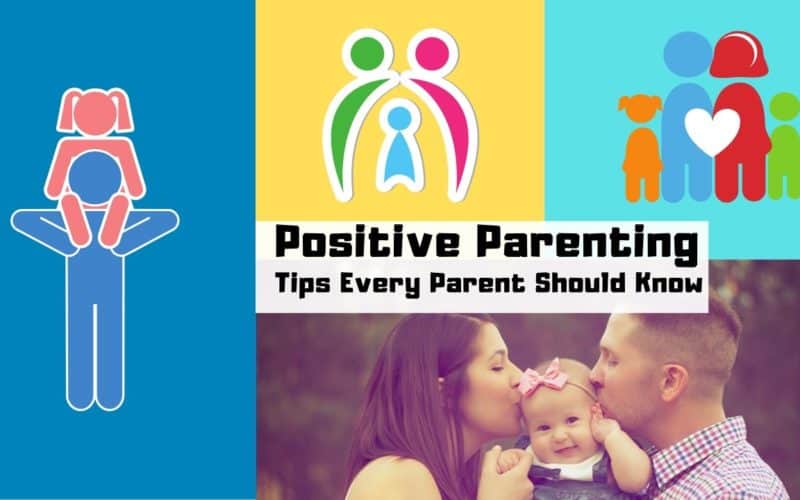Parenting is not an easy job. As Swiss psychiatrist Carl Jung once said, “Children are educated by what the grown-up is and not by his talk”.
Let me start by saying that if you’re reading this with a sense of abject failure, with kids destroying your home, and a partner who thinks you’ve let yourself go, you are not alone. But don’t worry, you’re doing a lot better than you think. Here are all kinds of parenting tips every parent should know.
Table of Contents
- Parenting Tips for Newborn
- Parenting Tips for Toddlers
- Parenting Tips for Preschoolers
- Parenting Tips for Teenager
- Back to School Parenting Tips
- Parenting Tips for Children with Adhd
- Parenting Tips for Young Adults
- Parenting Tips on Discipline
- Parenting Tips for Summer Vacation
- General Tips Every Parent Should Know
Parenting Tips for Newborn
Newborns are very difficult to figure out, mostly because they can not vocalize what they need when they need it. From feeding cries, to nap time cries, to bathroom cries, too many people, they all sound the same. Many new parents wonder if they will ever learn the different cries of their newborn, but with time and patience, you will be a professional at deciphering his or her cries in no time!

1. Ask for Help
The first key to caring for a newborn is asking for help. Many people have already experienced what you are going through, and are willing to help! The hardest part of this is actually asking for assistance, especially when you think you should know it all. Whether it’s your first baby or your fifth, many newborns create their own unique challenges, that can differ from one baby to the next.
2. Holding Baby
Newborns are to be held the same way; Make sure you start by washing your hands or using hand sanitizer. Babies have very weak immune systems and frequently are at high risk for infection. Support the baby’s head and neck, and cradle it in either the crook of your neck or the bend of your elbow.
Never shake a newborn baby, even playfully or to wake them up. Shaking can cause a brain bleed, which can be fatal for the infant. Always remember that newborn babies are not ready for rough play, and something as slight as bouncing the baby on your knee can cause irrecoverable damage.
Instead of shaking a baby awake, try gently tickling your baby’s foot or blowing on his or her cheek. Make sure your baby is securely in their stroller or car seat, to limit bumps and shaking.
3. Bonding with Baby
Bonding begins from the moment you or your spouse give birth; These key hours and days post-partum are some of the most important moments of both your and baby’s lives.
Bonding with your newborn baby contributes to emotional growth, which in turn, affects physical growth. Take the time to get adjusted to having a newborn around, and use a skin-on-skin method to get the most attachment with him or her. Having a strong bond with your newborn can help you parent your child throughout adolescence.
Babies oftentimes love vocal sounds, such as cooing, singing, and talking; Try playing classical music next time your newborn is fussy. However, not all babies love sounds, so if your newborn begins to startle or cry easily, or turn their face away, try a different approach.
Swaddling is another key factor of bonding with your newborn and is most effective within the first few weeks of life. Swaddling keeps the baby warm and gives most newborns a sense of comfort. Swaddling is a great technique for first-time parents to learn, as it can calm even the fussiest babies.
To swaddle, start with a receiving blanket spread out, with one corner folded over slightly. Lay the baby face-up diagonally on the blanket, with their head above the folded corner. Then, wrap the left corner of the receiving blanket over baby’s body, and tuck it beneath the baby, going under the right arm.
After this, bring the bottom corner up over baby’s feet, and pull it towards the head. If the fabric gets too close to the face, feel free to fold it down. While making sure not to wrap too tightly around the hips, wrap the right corner around your baby, over and behind the left side.
Make sure the baby’s hips and knees are slightly bent and turned out. Slip your hand in between the blanket and your baby’s chest, to make sure it isn’t too tight. Swaddling can be done up to when a baby is two months old; Any longer, they may roll over while swaddled, increasing the risk of Sudden Infant Death Syndrome, or SIDS.
4. Changing Baby
Before changing your newborn’s diaper, make sure you have everything you need within arm’s reach. Newborn babies can dirty diapers around 70 times a week, or ten times a day. Always make sure you’re properly cleaning your baby while changing, and wipe front to back to avoid a Urinary Tract Infection or UTI.
While changing your bouncing baby boy, be aware that the exposure to air can make baby urinate again, this time, with no diaper on. Diaper rash occurs when a baby’s sensitive skin is exposed to urine or feces and can be treated with a few warm baths and some diaper rash cream.
Consider leaving baby diaper-less at times as well. However, if the red and bumpy rash lasts more than three days, consult your child’s doctor, as it may be a fungal infection.
5. Bathing Baby
Always give the baby a sponge bath until the umbilical cord falls off and the belly button heals completely, which can take one to four weeks, and the circumcision heals, which can take one to two weeks.
Try to only bathe your baby up to three times a week in the first year; Any more frequent than that can irritate and dry the skin of your newborn. Sponge baths are done on any flat surface, and the baby will not be submerged in water. Focus on wiping the baby’s eyes, nose, ears, face, and hair, as well as the baby’s bottom and genitals. When it’s time to graduate to tub bathing, do so gently.
Start with a short bath, either in a sink or an infant tub. If the baby becomes agitated, return to sponge bathing for a week or two, and try again. For a tub bath, make sure the water does not exceed two to three inches deep. While bathing, make sure you frequently place warm, not hot, water over baby, so they do not get cold. Never leave the baby alone in a tub.
6. Feeding Baby
Whether you breastfeed or bottle-feed baby, it’s important that you feed baby on demand, or whenever they seem hungry. If your baby is crying or sucking on their fingers, there is a chance that the baby needs to eat.
Newborns need to be fed every two to three hours. If breastfeeding, the nurse about 10 to 15 minutes on each breast; If bottle feeding, start at 2-3 ounces of formula, or 60-90 milliliters.
Make sure you wake baby every three hours if he or she doesn’t show any signs of hunger, and if you frequently need to wake baby to eat, contact your pediatrician. Your newborn should produce at least six wet diapers, and have several bowel movements, throughout the day.
Newborns tend to swallow air during feedings, which creates gas. In order to burp your baby, hold them upright with their head on your shoulder.
Support the baby’s head and back while gently patting their back with your other hand. If this method doesn’t work after a few minutes, change the baby’s position. Lay him or her face down on your lap, making sure their head is higher than their chest, and gently pat or rub their back. To avoid spitting up, keep baby upright for at least fifteen minutes after feeding.
Having a newborn baby can be very stressful; There will be countless sleepless nights. However, it is completely, 100% worth every night spent awake, cradling, and feeding the new baby.
Parenting Tips for Toddlers
You’ve survived to have a newborn, and now you’re really in for a new adventure: Toddlers. From temper tantrums to time outs, toddlers can be extremely frustrated at times.
They can’t quite run, but they can walk, they can’t quite speak fluently, but they can babble like there’s no tomorrow.
They don’t deal with limits or disappointment well, and they can’t really express what they’re feeling, because in most cases, they’ve never felt it before. So how can we wrangle our rambunctious toddlers

1. Rules
Toddlers are being introduced to many things, rules being one of them. In order to be a productive member of society, we need to follow ground rules, and toddlers are at the beginning stages of learning them.
Instead of overloading your tiny tot with rules from the get-go, which can be extremely confusing and frustrating, prioritize rules pointing towards safety first. You can help your toddler obey these rules by making your home safer for them.
Praises can also help toddlers follow the rules, as well as a reward system.
2. Show Love
Toddlers thrive off of attention and your affection, due to the bonds made with them in the newborn stage of life. Hugs, kisses, and playful roughhousing are a few ways to reassure your toddler that you love them.
Knowing your child’s limits can help prevent temper tantrums, as well as slowing down and explaining things. Staying calm while your toddler says no and picking your battles are other ways to show your love for him or her.
Offering choices promotes independence and gives the toddler a sense of freedom. Communicating with your toddler is a key factor in showing them you love them.
3. Scheduling
Keeping a daily routine can help you raise your toddler to become a good child and an even better adult. However, make sure your schedule has some wiggle room, as toddlers can be extremely unpredictable.
In order to keep a daily routine, you should start small; Start by having a set bedtime and waking time, as well as a specific time for meals and snacks. Once your toddler masters this schedule, start adding in more activities to strengthen your toddler’s mind.
4. Punishment
Not every toddler is an angel, and many break the rules from time to time. Every toddler learns in their own unique way, and certain consequences will work for certain occurrences.
Many children learn from the natural consequences of their actions, as long as they are not harmful to the child. Putting your child in time out when they act out is another great way to enforce good behavior, but make sure you explain why they are in time out.
Withholding certain privileges, such as taking away a favorite toy, can also work in some situations. Whichever punishment you choose, make sure you stick to your guns and stay consistent; Don’t give in when he or she begins to lash out, cry, or have a temper tantrum.
Children are creatures of imitation. By showing your toddler the proper way to act, you enforce these positive behaviors.
Toddlers are tricky, but by setting a schedule, properly punishing, and showing your toddler that you love them, parenting during this phase of your child’s life can be a breeze. Toddlers don’t always listen, but by setting a good example, you can help shape the young mind into something wonderful.
Parenting Tips for Preschoolers
If only babies could be babies forever, then parents won’t have to worry about the stages of growing up of a child. It’s easier when the child starts to mumble words that don’t really make sense, but things get a bit tough when the child is learning how to crawl or walk (you’d really want to get the dangerous things out of the way).
Things advance and the child starts to learn how to arrange “real” words together, at this time you’re really careful of what you say. Then, the time comes when the child is old enough to go through an early childhood education. Pre-schoolers fall within the age bracket of 3-5 years.

- Let your child develop a strong reading habit. Read books to your child, take him/her to the book stores every weekend, Buy colorful books that can also attract your child to reading
- Let your child be able to construct simple and clear sentences. Developing good communication skills is important for your toddler. The child is able to express freely what is on his/her mind and you as a parent will understand clearly.
- Once you can get your child to be attentive, then most of the pre-school “hardship” can be overcome. Develop the listening ability in your child, by training him/her to always pay good attention.
- This stage is very foundational; hence it is important that your child learns how to follow instructions. Start by giving out simple instructions, and making sure your child follows them.
- Set up a routine for your child to follow, if you’re consistent, your child will come to understand that there is time for everything. Teaching your child this on time will enhance more focus for your child. Teach your child how to interact and be friendly. Let him or her understand the importance of teamwork and the fact that we’re always going to need people.
- Understand your child’s capacity. It is not wise to train your child the way you see your friend train hers. Know your child’s strengths and weaknesses and start relating with them on that level.
- Allow your child to make mistakes, it teaches them to be strong, allows them to think out of the box, and it sharpens their learning ability.
- Build a strong bond with your child, it makes them more open to learning, especially when they feel loved.
- Always reward your child, when something is done correctly, no matter how small.
- You can’t always be around your kid, especially when this phase kicks in. Don’t be overprotective of your child. Let him or her learn to be able to do stuff their own, definitely not complicated stuff. Be careful not to overdo it, remember; they are still kids.
In conclusion, this is that point to instill good qualities into your child so it becomes easier for you and your child. Always have in mind that there is always a need for a balance when parenting. Have fun with your kids and still lead them aright.
Parenting Tips for Teenager
Teenage years can be hard. You’re finally coming up to adulthood, quicker than a blink of an eye. From the first day of high school to first dates to the first time driving, teenagers grow up quicker than we would like to admit.
Just yesterday, we had our little bundles of joy swaddled comfortably. So what is the best way to raise your teen to be a proactive member of today’s society? Here are some tips to keep your teen on the right path.

1. Be A Friend
Many teenagers feel that their parents are their parents only, and not somebody they can confide in. By becoming both a parent and friend to your teenager, you build a level of trust that can get you far.
Many teens that tell their parents everything find themselves in less precarious situations, like drinking and driving. Becoming more than a parent to your teenager leaves room for conversations, and leaves somebody trustworthy for your teen to confide in.
This also opens up a whole new world of advice you can give your teen, and you can relate your past experiences to their situations, so they don’t make the same mistakes you did when you were growing up.
While being your teen’s friend can be a good thing for not only you but them as well, your teen may try to take advantage of their relationship with you. By setting boundaries, you can be both a friend and a parent, when the time calls for it.
2. Parent Appropriately
While it’s hard to acknowledge that your teenager is, in fact, a teenager, refusing to acknowledge the fact opens the door to rebellion. Teens are searching for freedom, and want to be seen as adults.
By coddling your teenager and setting strict rules on who they can see and what they can do, your teen may begin to rebel against you.
Don’t be afraid of your child hanging out with friends on a Saturday night, but be sure to tell them that you are simply a phone call away if they need you.
3. Encouragement
Encourage your teen to eat dinner with the rest of the family, to go on family outings to the movie, and get a full nine hours of sleep a night.
By keeping your standards high, you help your teen set high standards for not only themselves but their futures as well. Try to get your teen to read for an hour instead of scroll through social media before bed, push for healthy diets, and discourage caffeinated beverages after 5:00 pm.
Start holding family meetings weekly or biweekly, and set goals for not only your teen but for you and your partner, as well as any other children you may have.
Although teens may want independence, be sure not to push for too much independence too fast. It’s okay for them to pick their friends, but it’s not okay for you to push them to go on a date with somebody. That time will come; Be sure to be supportive in whatever independence your teenager wants to have when they want to have it.
4. Cut Them Some Slack
Think back to when you were a teenager; Things were weird and scary, and kind of thrilling all at once. Your teen is trying their best to blossom into the person they want to be.
If they forget their homework or talkback after a rough day, just know that they are trying their best. Between juggling home life, school life, extracurricular activities, and their social life, there’s constantly hundreds of things running through any teen’s mind at any given time.
Whether you have one teenager or three, raising a young adult to become a productive member of society is stressful; It’s also one of the most rewarding times in every parent’s life.
This is a pivotal point in anybody’s life, the last step until adulthood. We all want our teens to be happy, and healthy, and the best way to do that is to be there for them when they need you, whether or not they think they need you.
Teenagers are very independent but dependent at the same time. It’s up to you to push them to be the best person they can be.
Back to School Parenting Tips
The holidays are so much fun especially when we hang out with family and friends. Most times, it’s like we never want the holidays to end.
There are other times, well parents are psyched about the holidays coming to an end so our kids can get busier with school and less busy with trying to frustrate us.
Now that the holiday is coming to an end, you’d want to make sure that you’re ready for yourself and you’re Kids. Let’s discuss some tips.

1. Go Shopping
Many parents don’t pay attention to the important things until it’s almost time for your kid to go back to school. I always advise that you make a long list of what you will b needing, to avoid leaving some things out.
Once you’re in a rush, you can’t remember everything at once, so take your time to fill out your needs gradually until you’re ready to go shopping.
2. Have a Relaxed Routine
During the holidays still maintain a solid routine for your kids (it should be relaxed), so it doesn’t become too difficult for them to re-adjust to the normal routine. This doesn’t mean that you can’t have fun with your kids and take time to bond with them.
This should even be the time that you teach them stuff, you’d never had had the time to if not for holidays. If most of the routine is kept, you won’t be needing to set two weeks aside for “ending holiday habits”
3. Inform your Kids of Changes
You might consider making changes once the holiday begins to wrap up, this is not wrong but whatever it is that you may have in mind, as long as it concerns your children let them know about it. You might want to change their lunch time table or hire a lesson teacher.
Whatever it is that you are changing, your kids must know, so they are prepared ahead of time. Encourage your kids, talk to them about the problems they may encounter in their new school year, especially if they will be entering into a new class.
4. Have a Heart to Heart Talk
Remind your kids of the new things they had learned during the holidays, and how it may be useful to them. Discuss with your children things they would love to change, see or do when school resumes and help them achieve it as long as it is constructive. Remind them of safety measures, and things to do when in particular situations.
5. Home Work
Complete all outstanding homework.
6. Regulate Tv Time
It is impossible to keep your children from the TV during holidays, but not impossible to regulate TV time especially when you and your kids are preparing for life after the holidays.
In conclusion, don’t panic and also don’t allow your kids to. As you encourage your kids, encourage yourself too. As a parent know when you need to change methods. Above all, it is not about the method but the results. Make sure you’re productive as you get everything ready both in the material and moral aspect for both yourself and your kids.
Parenting Tips for Children with Adhd
The parenting role comes with its ups and downs, especially when your child is with a medical condition. For those of us who are wondering what ADHD might be, well, here’s what.
ADHD is an abbreviation for Attention Deficit Hyperactivity Disorder, which is a development impairment of the brain’s self-management system. It affects the brain and behavior of the affected person, but it is definitely not a mental disorder.
There is no known cause for the ADHD, but researchers suspect Genes. Genes or not, there, unfortunately, isn’t a known cure. Having to parent a child with this medical condition can be difficult, but once you are able to reduce or suppress the effects of the symptoms, then it is something that can be managed. In this section, we will talk about the symptoms and how you can reduce the effect on your kids.

1. Hyperfocus
This is when the child does not have the ability to focus on the right things at the right time. This is very crucial because it makes them less attention, and in other cases can make a child say un-related things.
As a parent, make sure you take away things that cause distractions. Create a special place for your child, where he or she can carry out activities that need focus.
2. Weak Impulse Control
Kids with this symptom are not able to control their impulses; this is another phrase for lack of self-control. They just do or say whatever when they feel like. Encourage exercising, this helps impulsivity and better channeling of emotions.
To promote self-control teach your child how to wait before saying or replying to anything. Finally, encourage them to always verbalize their thoughts and reasoning especially if in an emotional situation
3. Non-Organisation
Children with ADHD seem to be gifted with being disorganized. It is really difficult for them to keep track of things and time. The first most important thing to do is to create a solid structure for your child.
Let them understand that there is time for everything. Additionally, maintain a neat and organized home so your child knows where to put what. Lastly, have a large reminder board for your kid with duties written in different colors, this will go a long way.
In conclusion, as a parent, know when to show your child love, be flexible with your rules. As much as you try to let your child live a normal life, let him or her know what is right to do and what won’t be tolerated. Remember your child might not adapt easily to change as he or she normally should, so you will need to be patient and consistent.
Parenting Tips for Young Adults
So you have made through the rowdy toddler years, the dreaded teen years, and now see light at the end of the tunnel. Your child is not a “child” anymore but is a young adult. They are far more independent than ever and are ready to embark on their own.
However, just because they’re all grown up does not mean your job as a parent is over. It just means your style must change and adapt to your kid’s new independence. Here are a few tips on parenting your young adult child.

1. Maintain your Connection
We have all been young adults before. It is an exciting time, setting out on your own is exhilarating. So much so, parents often find themselves continually reminding their child to call them just so they can catch up.
As parents, we still want to maintain that connection we have shared with our children all of their lives. The best way to do this is to set up a connection routine.
Let your young adult know that you would really like to talk to them once a week. Explain that it doesn’t have to be a long conversation, but one that lets you know how they’re doing. Set up a designated time to talk, or, if they live close by, a time to come over and hang out with the family.
2. “You’re an adult now.”
I remember talking on the phone with my mom, and when she wanted to offer advice, she would always start with the phrase, “you’re an adult now.” I needed that affirmation. It reminded me that I was empowered to make my own decisions, and encouraged me to look at things from a different perspective.
Sometimes you need to tell your kid, “you’re an adult now,” it not only encourages and empowers them, but it also makes them feel respected and seen as more of an equal rather than a child.
It also helps them further to think through their choices with that lens on. It can remind them their choices are they’re own now, and any consequences will be their own.
3. Don’t Dictate
If you remember being a young adult, I’m sure you remember how you felt invulnerable and always knew the best path forward. I big part of being a young adult is making mistakes, and learning that they may not always know the best way.
While you may want to tell them what to do, try not to do that. Instead, ask to offer your advice. Don’t lecture your young adult, but let them know you have been in that situation and what actions you took to make it out. Offer it as an example. It’s crucial that you keep the communication lines open.
Telling them what to do, pressuring them, or guilt-tipping them will be an almost sure way of straining those lines of communication, and lessening the impact of your advice.
Parenting Tips on Discipline
One of the most important aspects of parenting is discipline. We all know we have the best children in the world, but even the best children will have their moments that test your limits and push the boundaries of rules.
The parent’s job is to make sure their child understands what actions lead to positive results in a way that translates as they grow older. Here are a few of the most important tips we found on disciplining your child the right way.

1. Rules for a Reason
It is often much easier to resort to the “do as I say because I said” line when parenting. Sometimes as parents, we feel too overwhelmed, busy, or unnecessary to explain the reasoning behind our rules.
After all, if the child does what we say, there will be no need for discipline. However, this form of discipline does not give a concrete reason behind the rules you layout. Children want to be part of the dialogue, so engage them.
When you set a rule, sit them down, explain why this rule is in place, and any consequences that may come from breaking. Answer any questions they may have.
Understanding and communication are essential factors in any relationship, and the child-parent relationship is no different.
2. Avoid Violence, Teach a Lesson
One of the many hats you, as a parent, must wear is one of a teacher. While you may not be teaching your child arithmetic and reading, you will be teaching them how to manage their actions to get positive results.
Teach your child that inappropriate actions will have immediate consequences. Remain firm when disciplining to instill that message, but the firm does not mean corporal.
It would be best if you avoided violence when parenting. Corporal punishment will only teach them and reinforce the idea that hitting or screaming will give them the result they want. Corporal punishment may also lead to lower self-esteem and other behavioral problems.
3. Keep Calm
Avoiding corporal punishment and negative reinforcement starts with you. Begin any intervention with your child by, first, calming yourself.
Punishment is never as effective as positive reinforcement, and disciplining when you are angry may lead to violent punishment or yelling, both of which may be counter-productive. Instead, commit yourself to take a step back when you’re upset, take a deep breath, and reassess the situation.
Your child seeing you do this may also pass that behavior down, reinforcing the idea that calm and reasonable interactions return positive results.
Parenting is hard, and learning how to do it effectively can take a lifetime of constant learning experiences. But keeping calm and remaining communicative are keys to success here. Shutting down and yelling may get your point across for that moment, but it will only reinforce other negative behaviors.
Parenting Tips for Summer Vacation
Summer is here! It’s a time for water slides, road trips, and vacations. For kids, its a time of carefree fun, without the hassle of curriculum and homework. For parents, its a time of memory-making where we can plan to all have fun as a family. But although kids have the summer off, parents do not. So here are a few tips on parenting for summer vacation.

1. Schedule Fun
While the concept of “scheduling fun” may seem overbearing, it is a vital part of a child’s summer vacation. You don’t want to fall in the trap of having your kids have too much downtime, because then only the TV and video games will become their babysitters.
Scheduling activities will ensure your kids have creative and constructive fun. Map out your activities on a calendar, and create a consistent routine.
While your child is happy not having to be in the constraints of the school schedule, they do still need security in knowing some things will stay the same. Try to enforce the same bedtimes and maintain the same chore schedule.
This way, you keep some consistency to fall back on during the school year, while also giving them more flexibility in how they spend their day.
2. Involve your Kids in the Planning
While scheduling fun can mean you can have more control over your kid’s activities, you want to make sure you also include your kid in their own schedules for fun. Overscheduling for your child means they lose the opportunity to build self-determination skills.
So, gather your child’s input. By asking if there is anything they would like to do this summer, you will spur their creativity. Encourage them to think of a new activity to try or to pick up a new hobby.
In the end, you want to make sure they have a stake in their own fun in the summer. Also, when they are having fun, those memorable moments will come much more frequently and authentically.
3. Keep your Kid’s Learning
While summer is a break from the constant hammering of information that kids go through during the school year, you want to make sure you are instilling a joy of learning through your vacations. You can do this by inviting your kids on an adventure.
Ask them to explore and ask questions. Again, let them try new things! New activities encourage growth and development as well as encouraging creativity and curiosity. You do not have to start a living room summer program to keep your kids learning in the summer.
In fact, doing so will leave your child feeling drained when the school year starts again. Instead, plan exciting trips and activities that inspire curiosity.
Summer can be a fun, memorable time full of learning and creativity. Look to your child for the things they look to do, and they look to you to make sure it happens in the best way possible!
General Tips Every Parent Should Know

1. Be who you want them to be
Whatever you do in life, your children will mirror you, whether immediately or in years to come. If you don’t want them to smoke or drink, don’t be a smoker or drinker. If you want them to read books, read books yourself. And don’t use your phone! Read a real book so that they know you’re reading and then they will imitate you.
2. Love them no matter what
Positive parenting starts with your own actions. Your children are not the same as your favorite shirt or handbag, that you may like one week and dislike the next. You must love your kids every second of every minute of every day.
Moreover, you must show them that you love them no matter what. If you need to deal with a toddler then you can follow several toddler discipline tactics that work.
3. Be firm but fair
It is not fair to keep changing your mind. Your kids need constants in their lives and that includes the rules and regulations that you want them to live by. This means you also need to be on the same page as your partner. Agree together on what is acceptable and what is not and stick with it.
4. Be the person your child goes to
If you are not the person your child runs to, then you’re doing something wrong. Of course, your child may go to you for some things and your partner for others, and there is no problem with that. As long as your child feels she has somewhere to go for help, then hopefully they’ll keep coming to you when they’re older.
5. Communicate with your children
Talk to your children as often as you can about anything and everything. But communication is not just talking but also listening. When your child is talking to you, give them your attention. Don’t brush your child aside when they want to talk. Remember that there will come a time when you want to talk to your children and they’ll be too busy for you.
6. Remember you were a child
Our next positive parenting tips are that try to remember that you were a child once, interested in childish things, and preoccupied with childish thoughts that seemed so serious. As far as your child is concerned, their thoughts are just the same.
While listening to your child’s ideas on why Barney the Dinosaur is purple for the thousandth time may be somewhat trying, for your child, this is a serious concern.
7. Never ever smack
I’m sorry if this sounds all incense and kaftans, but there is never an occasion when your child deserves a smack. Parents smack children because of their own worries, anger, or frustration, not because the child deserves it.
Remember, that every smack you give your child can seem like a betrayal, and your child may never forget it. Beware, regarding the traits of toxic parenting which can ruin children’s lives.
8. Keep things in perspective
Your little angel running around like a crazy thing may seem like the most annoying moment in your life but it’s not. Children run around and make noise. That, and eating you out of the house and home and costing a fortune, is their raison d’etre when. Whatever your child is doing is nothing in the big scheme of things. So, treat it as such.
9. Don’t punish, praise
The key to positive parenting is praise but no punishment. Praising your child is so much more positive than punishing. Praising influences more positive behavior in children whereas punishment has the exact opposite effect. Praise often and continually, punish rarely if ever.
10. Avoid sarcasm
If you are the sort of person who responds sarcastically to things your friends say, don’t do it with your children. Sarcasm is a negative response, even when meant humorously. But it is also difficult to understand and your children may not have the intellectual capacity to understand sarcasm, so praise positively, not sarcastically.
11. Limit the internet
As positive parents, as well as an adult and your children, are not, and you know what is best for your kids. The internet, in general, is not a positive place for your children to spend their time. If your children need the internet for school, then they should be using it in front of you, and not unsupervised in their bedrooms.
12. Say no to gadgets
This was one of the strictest rules when my kids were growing up. They could have as many books as they liked, and I would buy them books for most weeks. However, no matter how often they asked for a phone, iPad, or other gadgets, my answer was always the same. They are far safer without gadgets than with them.
13. Accept life has changed
When you have children, your own life is well and truly over. Okay, that may be an exaggeration but your control over your life pretty much is. From the moment your first child is born, your wants and needs come second to your children’s. Accept that and get over it; you’ll be happier when you do.
14. Ask for help
If you need help, ask for it. You are not some sort of super-parent and, more importantly, you are not expected to be. You may want to do everything on your own but you must accept help when it’s offered, and ask for it when it is not. Save your energy for the times when there is no one around but you.
15. Remember you are human
Do not set standards for yourself that are unrealistic. You can’t be there for your children 24/7 and no one expects you to be. Things go wrong when kids are involved and 99 times out of 100 whatever went wrong has very little importance in the big scheme of things.
And there you have all the positive parenting tips. When you have kids, don’t take life too seriously, accept that even the best-laid plans go wrong and that you are not perfect and no one expects you to be. My one last tip, actually more an admonishment, is to spend your life enjoying your children; they won’t always be around.





